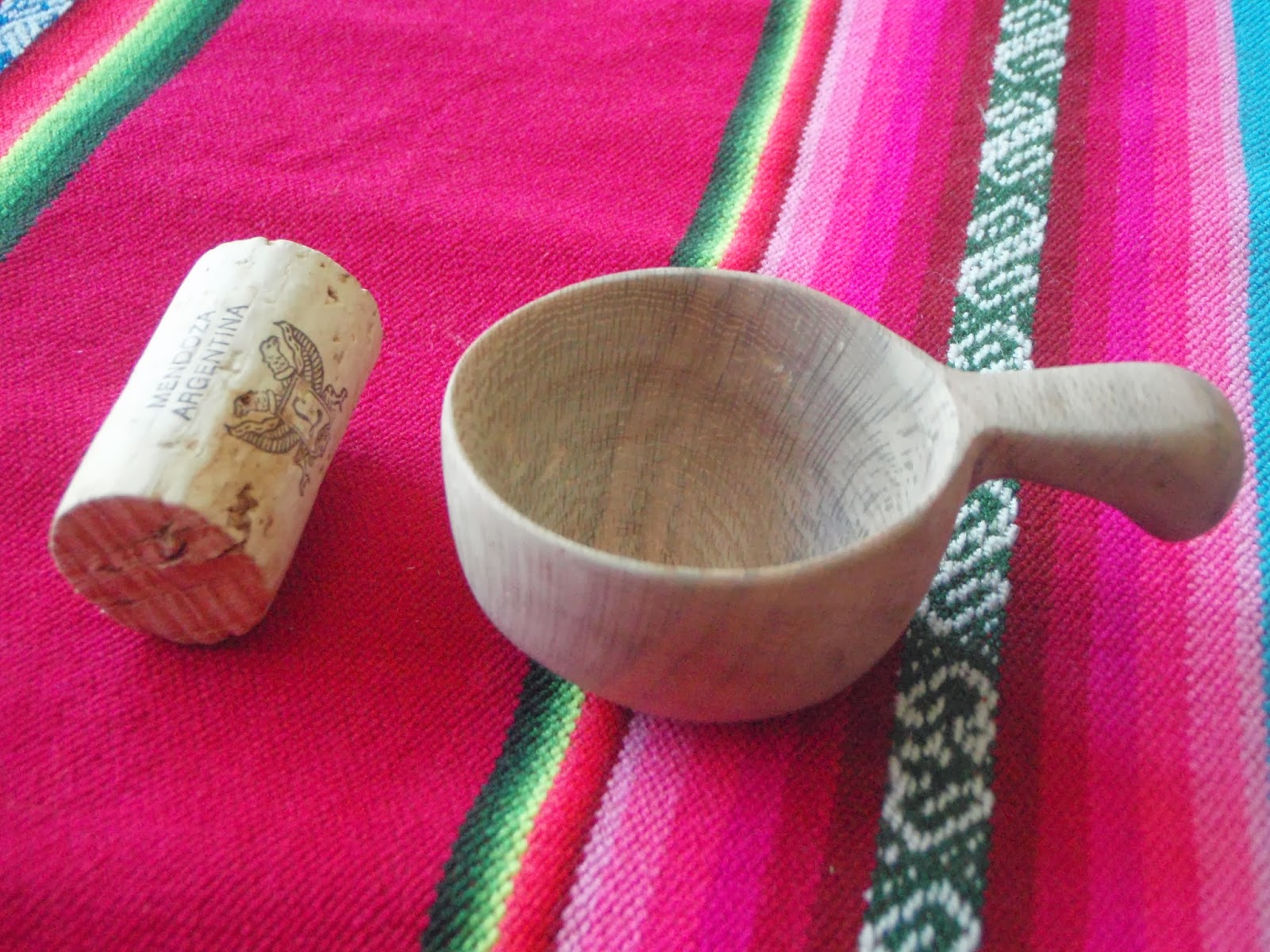The thing I have found most gratifying about the last year of blogging is to learn how a shared interest, such as green woodworking or spoon carving, is a bridge that through the miracle of the internet spans the world, bringing otherwise distant people and places right into my sitting room. Without wishing to sound too sad or pitiable, like most other people I am very busy and don't have a lot of time for friendship, but spoon carving has brought more friends, from more countries, than I could ever have imagined. And to prove that point, here are the beautiful spoons of my newest friend, Lujan Vernieri.
Lujan lives in Trelew, Chubut, Patagonian Argentina.
 |
| This little scoop looks more like a kuksa, but you will see by comparison to the cork beside it that it is actually more like a coffee scoop in size. It is carved from Radal, which grows naturally in Cordillera Andina, 800 KM from where Lujan lives and was an offcut from a carving workshop. |
 |
| This is another small scoop carved in CEREJEIRA, which is an indigenous wood of Brazil. Lujan calls this her "little eggy spoon" and it was made from the front panel of an old draw. Cerejeira is similar to oak and has a rich tannin aroma. |
 |
| This beautiful serving spoon is also made from Radal, and was originally longer in the handle, but it broke when Lujan tried to put hole through it, which must have been serendipity as it looks perfect as it is. |
 |
| This spoon is carved in Lenga and is one of Lujan's favourites. It has a knot in the handle and was finally polished with a walnut, which I presume deepens the colour and oils at the same time. |
 |
| This lovely scoop, which was Lujan's first spoon, is made from Algarrobo wood and was an offcut from some bunk beds which were then converted into single beds for her children. I think this kind of back story really adds value to a spoon. |
 |
| This cooking spoon is carved in Paraiso and has a simple but aesthetically appealing form. Lujan said that it took a lot of patience to ensure the regularity of the long handle. |
 |
| Lujan says that this spatula, carved in Lenga, is just a practice piece and that she was not very happy with the results as she found carving a knot particularly difficult. I think she's being hard on herself and would be very proud to have carved it. |
 |
This spoon, carved in Radal wood, is an example of one of those spoons that we should have thrown away before going too far with it, due to the knot in the handle but which, once persevered with and finished, we love all the more for it being there. This spoon is also polished with a walnut.
The background fabric for all Lujan's photos is call aguayo and is a tradition cloth woven and used in the Northern Argentina, Bolivia and Peru and is used by the women in those countries to tie their babies to their backs. |
 |
Thanks Lujan for sharing your spoons with us - they are beautiful!
Now, if you are reading this post and you yourself carve spoons, then take the plunge - send me an email with a couple of photos of perhaps your favourite spoon, or your most recent or unusual spoon and tell me a little about yourself.
Email photos to: fiftytwospoons@gmail.com
THIS BLOG NEEDS YOU!
|

















Woau! Patagonia! From the other end of the world...Very impressive!
ReplyDeleteLove that "little eggy spoon".
I noticed the exceptional background fabric, too.
Wonderful. I am very interested in the Walnut process you spoke of. If it indeed can darken wood if even just a bit. All wood I can get my hands on seems to be very light and bland. I really need to find a source. The beauty of the wood of course makes such a difference. I will soon send in some photos. Although I have given away what I feel are my best spoons.
ReplyDeleteThank you for blogging!
Cheryl
from Los Angeles
Very interesting to see what people all around the world are carving. Love the cups, spoons, and cloth! Do you just rub the spoons with a nut? Sounds intriguing! Got to try it!
ReplyDelete